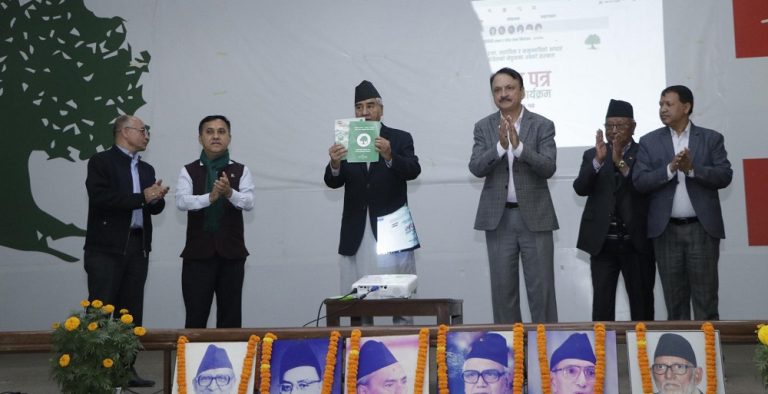
The ruling Nepali Congress (NC) unveiled its election manifesto today, pledging to deliver on a host of agendas after being elected in the upcoming parliamentary election on November 20.
The NC has expressed its determination to lead the next government yet again while safeguarding the constitution and envisioning a prosperous Nepal. The party’s slogan for the upcoming parliamentary and provincial elections is ‘Safeguarding constitution, base for stability and prosperity: Next government will be led by Nepali Congress’ and the manifesto presents pledges for the continuation of newness and a prosperous Nepal.
The oldest democratic party in the country also expressed its commitment to create 1.2 million jobs within five years while aiming to achieve at least 7 per cent of annual economic growth.
NC will adopt policy to increase the share of domestic manufacturing industries in the national economy from present 5.6 per cent to 9 per cent.
Party’s general-secretary Bishwa Prakash Sharma shared that the manifesto was prepared acting on the commitments announced by the party and the manifesto was based on the concept of ‘Prosperous Nepal’ envisaged by BP Koirala some 75 years ago.
Under the sectoral primary priority, the NC aims to make all citizens able, competent and self-reliant by transforming entire education system economically and socially.
Commitments have been made to take literary rate among women between 15-24 age group to 95 per cent, increase access of internet services in community education institutions to 80 percent, increase the enrollment rate in grades 11 to at least 50 percent and incorporate technical and vocational skills in the curriculum up to 40 per cent.
Considering ‘remarkable’ achievements in public health sector in the country due to the policy enacted by the Nepali Congress in the past, the party yet again promises to develop people-centric integrated national health system to ensure access of the ordinary citizens to quality healthcare services.
Towards this, the NC has put forward the plan of ‘Tin Trihatar’ (Three to Seventy Three’ according to which, children below three years and senior citizens above 73 years will be provided free healthcare services, informed Dr Swarnim Wagle, coordinator of the Committee that prepared the manifesto.
Reducing the mortality rate from non-communicable diseases by one-third, increasing average life-expectancy of the Nepalis to 73 years, decreasing maternal mortality rate to 80 per 100,000 live births, bringing everyone under the ambit of health insurance scheme by cent per cent, increasing the scope of the health insurance to Rs 1 million and reducing the malnutrition among children to 20 per cent are the highlights of the manifesto.
Furthermore, NC has adopted the policy of optimising information technology to increase economic activities, ensure good-governance, promote innovation and creativity among young entrepreneurs, researchers and entire private sector by increasing their access to technology.
According to the manifesto, the share of research and development which accounts for 0.3 per cent in the Gross Domestic Production would be increased to 0.7 per cent. At least 200,000 youths will be involved in information communication sector. Information Knowledge Park will be set up in all seven provinces while each province will have telemedicine centres.
As for climate action and environmental protection, the party has also expressed its commitment to initiate the roadmap of green economy according to the target to reduce carbon emission to net zero by 2045, increase the usage of electric vehicle and stoves by 50 per cent, increase the forest coverage in the country to 47 per cent and increase the number of climate change research centre.
Meanwhile, the NC has predicted that the Asia-Pacific area would be a stage for international geopolitical pressure and competition in the coming days given the conventional interest of the western countries and the economic revival of Nepal’s neighbouring countries, India and China.
The NC, towards this, has adopted the policy of ‘diplomacy of mutual benefit’. The party upholds the ideology that Nepal, situated on the top of the Asia, should not embroil in geopolitical conflict. The party viewed that Nepal should exercise diplomacy of mutual benefits, and adopt the policy of ‘diplomacy of mutual benefits.’
The NC acknowledges the massive economic potentials of the Nepal’s topography in the sector of energy, tourism, agriculture and information technology, and asserts that the shifting of world’s economic gravity towards Asia meant that exports, direct foreign investment, middle-class tourism and availability of subsidised capital were favorable for development efforts for Nepal.
Furthermore, NC announced its aim to attract as many as 2 million foreign tourists to Nepal within next five years. The annual foreign tourists’ influx to Nepal at present stands at 1.2 million.
Also, the party aims to increase the production of food, vegetables and fruits items, meat, fish, dairy products and spices, and make Nepal self-sufficient on them. Priority will be given to national and international researches for the development of high-yielding crops and livestock.(RSS)






